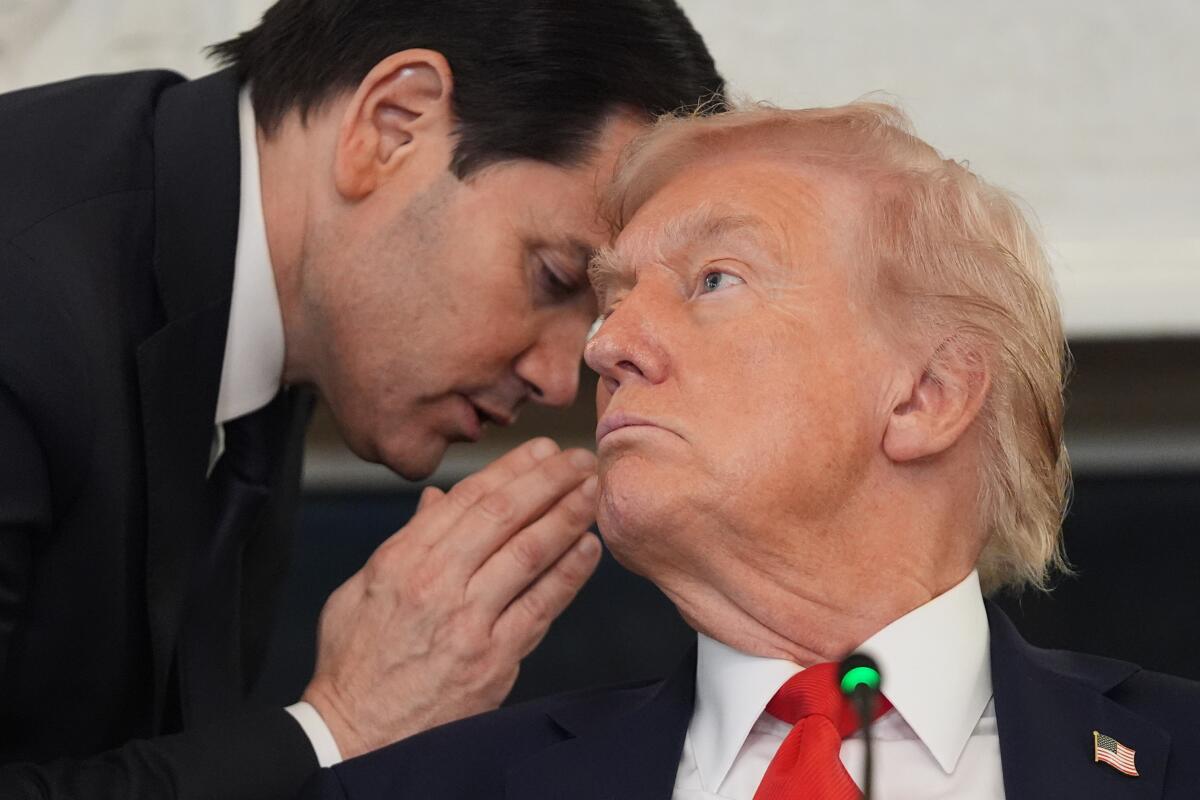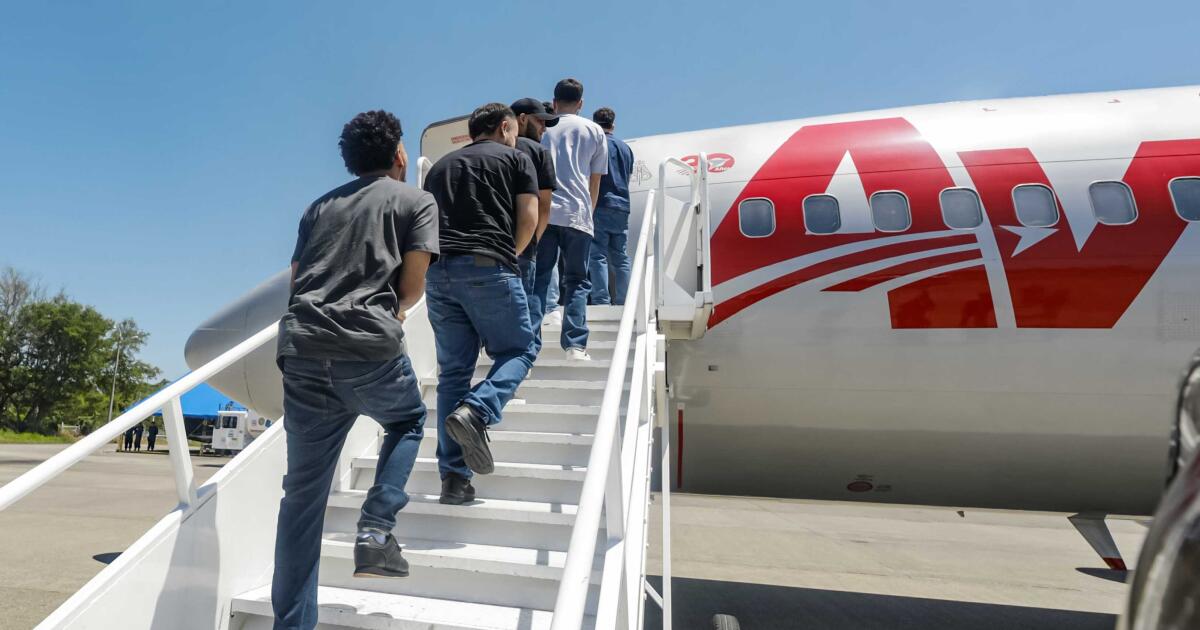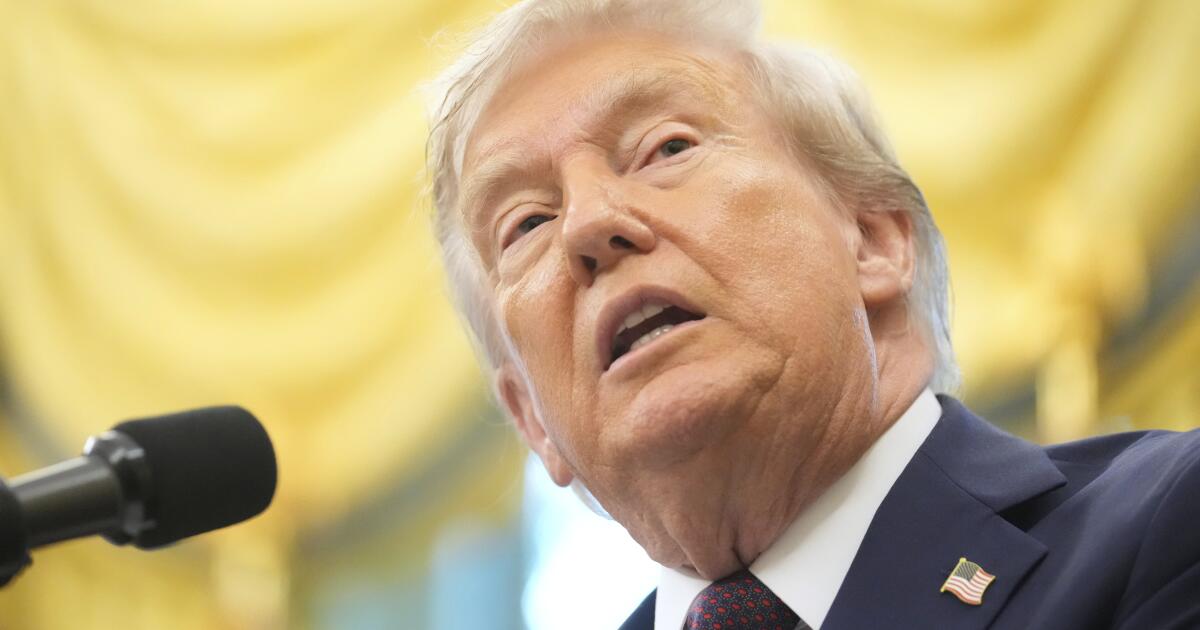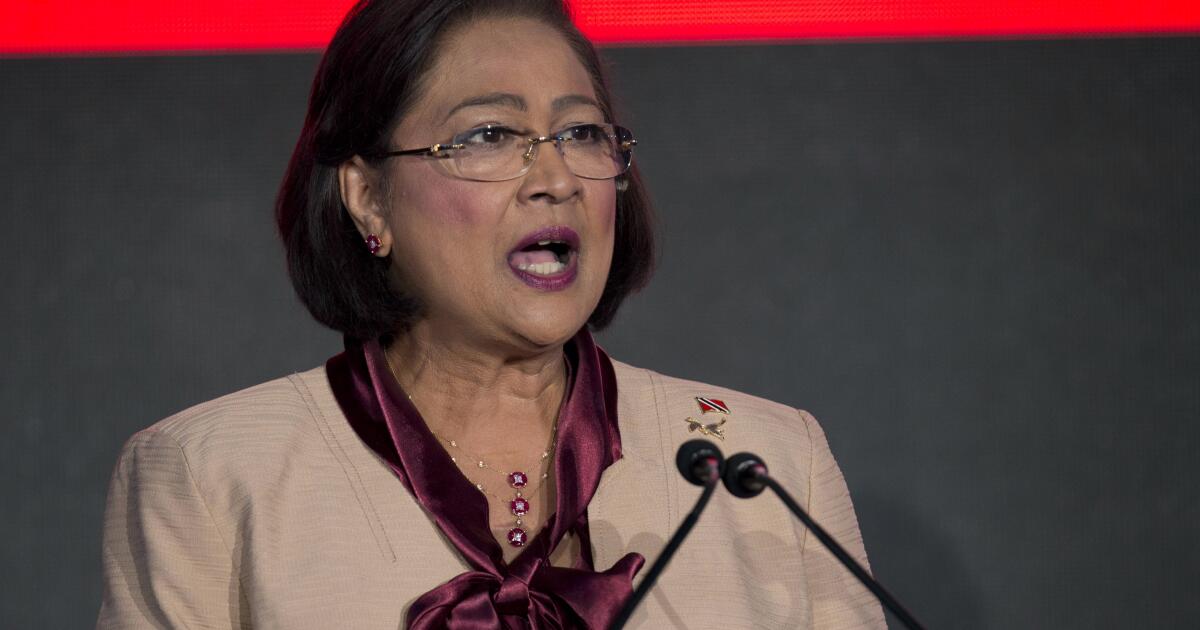How Rubio is winning over Trumpworld on striking Venezuela
In the early days of President Trump’s second term, the U.S. appeared keen to cooperate with Nicolás Maduro, Venezuela’s authoritarian leader. Special envoy Ric Grenell met Maduro, working with him to coordinate deportation flights to Caracas, a prisoner exchange deal and an agreement allowing Chevron to drill Venezuelan oil.
Grenell told disappointed members of Venezuela’s opposition that Trump’s domestic goals took priority over efforts to promote democracy. “We’re not interested in regime change,” Grenell told the group, according to two sources familiar with the meeting.
But Marco Rubio, Trump’s secretary of State, had a different vision.
In a parallel call with María Corina Machado and Edmundo González Urrutia, two leaders of the opposition, Rubio affirmed U.S. support “for the restoration of democracy in Venezuela” and called González “the rightful president” of the beleaguered nation after Maduro rigged last year’s election in his favor.
Rubio, now also serving as national security advisor, has grown closer to Trump and crafted an aggressive new policy toward Maduro that has brought Venezuela and the United States to the brink of military confrontation.
Secretary of State Marco Rubio whispers to President Trump during a roundtable meeting at the White House on Oct. 8, 2025.
(Evan Vucci / Associated Press)
I think Venezuela is feeling the heat
— President Trump
Grenell has been sidelined, two sources told The Times, as the U.S. conducts an unprecedented campaign of deadly strikes on suspected Venezuelan drug boats — and builds up military assets in the Caribbean. Trump said Wednesday that he has authorized the CIA to conduct covert action in the South American nation, and that strikes on land targets could be next.
“I think Venezuela is feeling the heat,” he said.
The pressure campaign marks a major victory for Rubio, the son of Cuban emigres and an unexpected power player in the administration who has managed to sway top leaders of the isolationist MAGA movement to his lifelong effort to topple Latin America’s leftist authoritarians.
“It’s very clear that Rubio has won,” said James B. Story, who served as ambassador to Venezuela under President Biden. “The administration is applying military pressure in the hope that somebody inside of the regime renders Maduro to justice, either by exiling him, sending him to the United States or sending him to his maker.”
In a recent public message to Trump, Maduro acknowledged that Rubio is now driving White House policy: “You have to be careful because Marco Rubio wants your hands stained with blood, with South American blood, Caribbean blood, Venezuelan blood,” Maduro said.
As a senator from Florida, Rubio represented exiles from three leftist autocracies — Cuba, Nicaragua and Venezuela — and for years he has made it his mission to weaken their governments. He says his family could not return to Cuba after Fidel Castro’s revolution seven decades ago. He has long maintained that eliminating Maduro would deal a fatal blow to Cuba, whose economy has been buoyed by billions of dollars in Venezuelan oil in the face of punishing U.S. sanctions.
In 2019, Rubio pushed Trump to back Juan Guaidó, a Venezuelan opposition leader who sought unsuccessfully to topple Maduro.
Rubio later encouraged Trump to publicly support Machado, who was barred from the ballot in Venezuela’s 2024 presidential election, and who last week was awarded the Nobel Peace Prize for her pro-democracy efforts. González, who ran in Machado’s place, won the election, according to vote tallies gathered by the opposition, yet Maduro declared victory.
Rubio was convinced that only military might would bring change to Venezuela, which has been plunged into crisis under Maduro’s rule, with a quarter of the population fleeing poverty, violence and political repression.
But there was a hitch. Trump has repeatedly vowed to not intervene in the politics of other nations, telling a Middle Eastern audience in May that the U.S. “would no longer be giving you lectures on how to live.”
Denouncing decades of U.S. foreign policy, Trump complained that “the interventionalists were intervening in complex societies that they did not even understand.”
To counter that sentiment, Rubio painted Maduro in a new light that he hoped would spark interest from Trump, who has been fixated on combating immigration, illegal drugs and Latin American cartels since his first presidential campaign.
Venezuelan presidential candidate Edmundo González Urrutia, right, and opposition leader María Corina Machado greet supporters during a campaign rally in Valencia before the country’s presidential election in 2024.
(Ariana Cubillos / Associated Press)
Going after Maduro, Rubio argued, was not about promoting democracy or a change of governments. It was striking a drug kingpin fueling crime in American streets, an epidemic of American overdoses, and a flood of illegal migration to America’s borders.
Rubio tied Maduro to Tren de Aragua, a Venezuelan street gang whose members the secretary of State says are “worse than Al Qaeda.”
“Venezuela is governed by a narco-trafficking organization that has empowered itself as a nation state,” he said during his Senate confirmation hearing.
Meanwhile, prominent members of Venezuela’s opposition pushed the same message. “Maduro is the head of a narco-terrorist structure,” Machado told Fox News last month.
Security analysts and U.S. intelligence officials suggest that the links between Maduro and Tren de Aragua are overblown.
A declassified memo by the Office of the Director of National Intelligence found no evidence of widespread cooperation between Maduro’s government and the gang. It also said Tren de Aragua does not pose a threat to the U.S.
The gang does not traffic fentanyl, and the Drug Enforcement Administration estimates that just 8% of cocaine that reaches the U.S. passes through Venezuelan territory.
Still, Rubio’s strategy appears to have worked.
In July, Trump declared that Tren de Aragua was a terrorist group led by Maduro — and then ordered the Pentagon to use military force against cartels that the U.S. government had labeled terrorists.
Trump deployed thousands of U.S. troops and a small armada of ships and warplanes to the Caribbean and has ordered strikes on five boats off the coast of Venezuela, resulting in 24 deaths. The administration says the victims were “narco-terrorists” but has provided no evidence.
Elliott Abrams, a veteran diplomat who served as special envoy to Venezuela in Trump’s first term, said he believes the White House will carry out limited strikes in Venezuela.
“I think the next step is that they’re going to hit something in Venezuela — and I don’t mean boots on the ground. That’s not Trump,” Abrams said. “It’s a strike, and then it’s over. That’s very low risk to the United States.”
He continued: “Now, would it be nice if that kind of activity spurred a colonel to lead a coup? Yeah, it would be nice. But the administration is never going to say that.”
Even if Trump refrains from a ground invasion, there are major risks.
“If it’s a war, then what is the war’s aim? Is it to overthrow Maduro? Is it more than Maduro? Is it to get a democratically elected president and a democratic regime in power?” said John Yoo, a professor of law at UC Berkeley, who served as a top legal advisor to the George W. Bush administration. “The American people will want to know what’s the end state, what’s the goal of all of this.”
“Whenever you have two militaries bristling that close together, there could be real action,” said Christopher Sabatini, a senior fellow for Latin America at the think tank Chatham House. “Trump is trying to do this on the cheap. He’s hoping maybe he won’t have to commit. But it’s a slippery slope. This could draw the United States into a war.”
Sabatini and others added that even if the U.S. pressure drives out Maduro, what follows is far from certain.
Venezuela is dominated by a patchwork of guerrilla and paramilitary groups that have enriched themselves with gold smuggling, drug trafficking and other illicit activities. None have incentive to lay down arms.
And the country’s opposition is far from unified.
Machado, who dedicated her Nobel Prize to Trump in a clear effort to gain his support, says she is prepared to govern Venezuela. But there are others — both in exile and in Maduro’s administration — who would like to lead the country.
Machado supporter Juan Fernandez said anything would be better than maintaining the status quo.
“Some say we’re not prepared, that a transition would cause instability,” he said. “How can Maduro be the secure choice when 8 million Venezuelans have left, when there is no gasoline, political persecution and rampant inflation?”
Fernandez praised Rubio for pushing the Venezuela issue toward “an inflection point.”
What a difference, he said, to have a decision-maker in the White House with family roots in another country long oppressed by an authoritarian regime.
“He perfectly understands our situation,” Fernandez said. “And now he has one of the highest positions in the United States.”
Linthicum reported from Mexico City, Wilner from Dallas and Ceballos from Washington. Special correspondent Mery Mogollón in Caracas contributed to this report.



